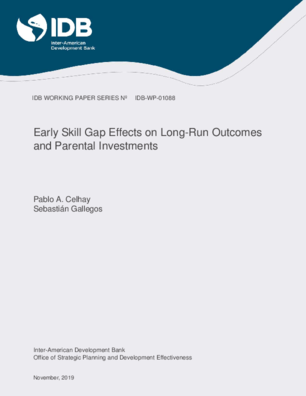Early Skill Gap Effects on Long-Run Outcomes and Parental Investments
Date
Jan 2020
This paper examines the effects of skill advantages at age six on different types of parental investments, and long-run outcomes up to age 27. We exploit exogenous variation in skills due to school entry rules, combining 20 years of Chilean administrative records with a regression discontinuity design. Our results show higher in-school performance and college entrance scores, and sizable effects on college attendance and enrollment at more selective institutions, in particular for low-income children. Our findings suggest that parental time investments are neutral to early skills gaps, while monetary investments are reinforcing and likely to be mediating the long-run effects.




